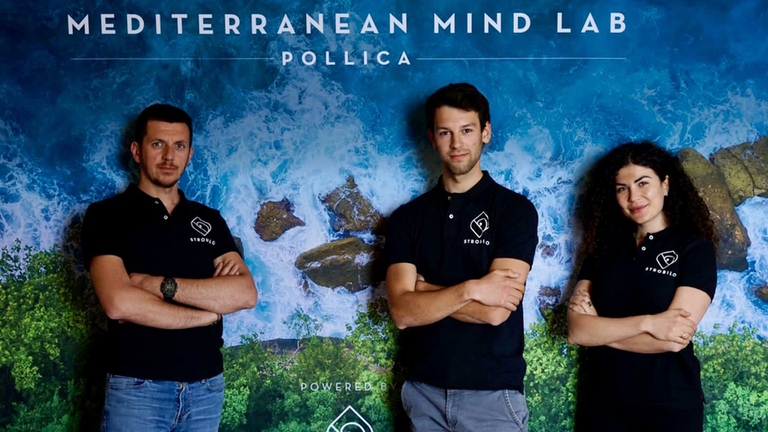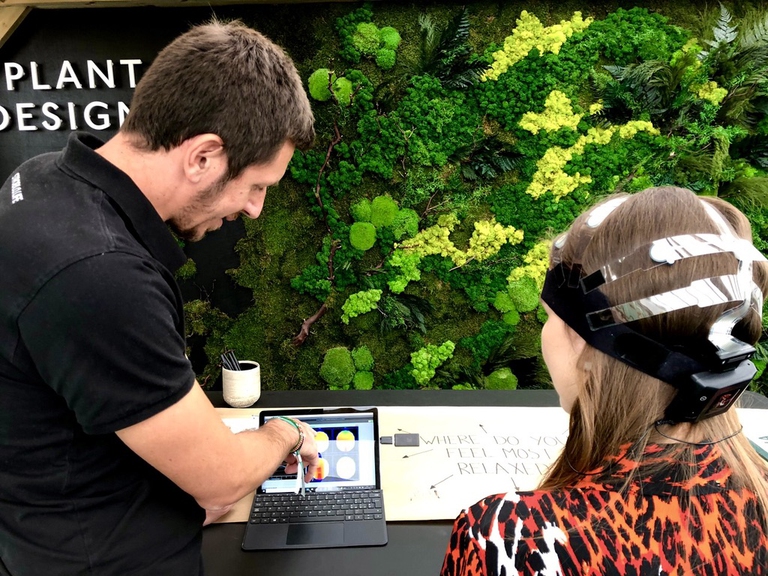https://www.lifegate.it/strobilo-ambiente-performance-neurologica
- |
- Applied neuroscience has found that with an increase in CO2 the brain begins to reduce its performance, for example the level of attention decreases.
- In the same way, the stress level is lowered when you come into contact with greenery, the forest, nature.
- Strobilo collects environmental data to create optimal conditions and improve people's well-being and performance.
There is one thing we do continuously, at every moment, day and night: breathe.THE'air it provides the oxygen our body needs but, if its quality is poor, our health also slowly pays the consequences.
"THE'air pollution that we breathe in big cities (and not only) has exceeded the alert level for years.This can be seen from the effects it has on people's health and from the parameter measurements that leave no room for doubt.In many Asian cities it is now unthinkable to live outside all day, we take refuge inside buildings where air filters and purifiers are positioned", he confirms Simone Molteni, scientific director of LifeGate. “It's time to raise our awareness of this issue to help everyone improve the environments we live and work in:LifeGate wants to make its contribution by offering knowledge and tools to act consciously."
Also the Work Of Strobilus, innovative startup of the ecosystem of LifeGate Way, is particularly centered on this theme.

The relationship between the organism and the environment is at the center of Strobilo's work
Strobilus was born with the ambitious goal to re-establish the healthy relationship of people with the environment around them.And neuroscience offers great potential, as the founder of Strobilo, Andrea Bariselli, psychologist and neuroscientist with years of experience in the clinical and applied research environment and passionate about life in the open air.
Our body was designed to function in a certain environment with certain characteristics and has adapted over thousands of years.However, if the external environment changes suddenly, it is not able to react so quickly. The “great acceleration” ofanthropocene is broken down into a series of macro indicators that concern the planet and consequently impact on human living conditions:increase in population, in the concentration of carbon dioxide, in the rate of extinction of animal and plant species, in deforestation.Man has moved further and further away from nature, but his body is still designed to be in the green.This is demonstrated by the neuroscience:the brain reacts when it is exposed to the natural environment, stress levels are lower and you feel more at ease.It is precisely from here that Strobilo's work takes inspiration.
Strobilus and neuroscience
Strobilo defines itself as a "nature-tech company" that uses the most advanced techniques of neuroscience in combination with artificial intelligence to study the relationship between humans and planet Earth.After years of working in the clinical research environment, in 2021 Andrea Bariselli launched Strobilo, of which he is CEO, together with Achille Donati, chartered accountant and financial manager of the startup.
For years Bariselli has studied the way in which neurons activate when subjected to a stimulus, finding that every small change in the environment generates an impact on the brain.Applied neuroscience maps such inputs and correlates them to brain response.Now Strobilo goes one step further:uses that knowledge to work backwards, put people in a position to live in the best environment, modulating every single environmental lever.
Strobilo links the data obtained via electroencephalogram and the environmental data read through a special device of its own production within a platform.At this point the predictability:by measuring the environment, Strobilo is able to predict what people's behaviors will be and can use this data not only to correct any anomalies, but to designing the spaces of the future.

How the environment impacts people's cognitive abilities
Poor air quality in closed spaces generates a series of physical and cognitive alterations, known as workers' syndrome or sick building syndrome.Among the first alterations there are tiredness, alteration of the sleep-wake cycle, allergies, respiratory problems, dry eyes;among the latter, less easy to perceive, difficulty concentrating, reduction in problem solving skills and cognitive fatigue.
A clear example is that linked tocarbon dioxide, which is the main indicator of air quality in closed spaces.CO2 is toxic to humans at a concentration of 2.5 percent, but starting from a concentration of 0.08 percent (800 ppm) performance, concentration and well-being are compromised.The World Health Organization also considers the maximum CO2 level beyond which our health is at risk between 700 and 1,000 ppm.Likewise, there is a limit level for i volatile organic compounds (VOC), elements present above all in the closed environments, among which we find ethanol, benzene, formaldehyde and acetone and dichlorobenzene.
Also temperature and humidity they impact people's health and their performance, which is why a good balance of both should be maintained;which would also play in favor of energy efficiency.The threshold levels to be maintained in indoor environments are approximately 20-23°C at a relative humidity level of 30-60 percent, variable based on the season.
When it comes to cognitive impairment we are referring to the fact that the brain loses clarity, calculation capacity, strategic planning, works little and badly.If we are able to clean up an environment and make it suitable, performance improves.In this sense Strobilus also flanks the companies intend to put the their employees in the conditions to work at their best, which means protecting both their well-being and their productivity.In reality, Strobilo also aims to impact public policies at a higher level, providing data and knowledge to decision makers, for the benefit of citizens' health.
Strobilo's analyzes at the Green&Blue festival
Strobilo was also at the festival Green&Blue which was held at the beginning of June 2022 at the Franco Parenti theater in Milan, and of which LifeGate was a partner.
For a whole day, meetings and debates took place in two areas of the theatre:the talk room and the foyer.Strobilo made it possible to analyze the trend of the concentration of CO2, Voc, temperature and humidity in these spaces and consequently the level of physical and cognitive stress to which the audience and the speakers were subjected.
As can be seen from the graphs, the day took place without unhealthy peaks from the point of view of thermal stress in the two areas, while both carbon dioxide and volatile component values exceeded the recommended threshold.
Strobilo offers two solutions, one short-term and one long-term.In the immediate future, opening the windows allows you to guarantee a air circulation in the room which would reduce both thermal stress and the concentration of CO2 and Voc.In this case, it would also be appropriate to provide a break between one panel and another, during which people can leave the room and help reduce the concentration of pollutants.As a more lasting solution, however, Strobilo proposes to increase the intensity and efficiency of the aeration and purification devices, or even carry out achemical analysis of the structural components and products used in the building that could create emissions inside the theatre, so as to remove or replace the most harmful ones.
It therefore seems clear how the detection of pollution and certain environmental parameters can become a tool for improving people's well-being through thoughtful design of spaces in which they live. A fascinating and complex topic that we will certainly hear more and more about.




